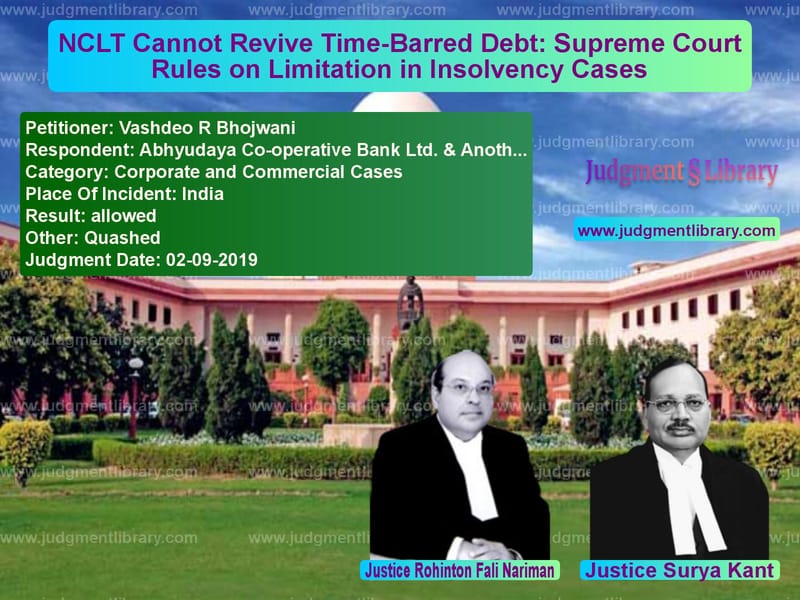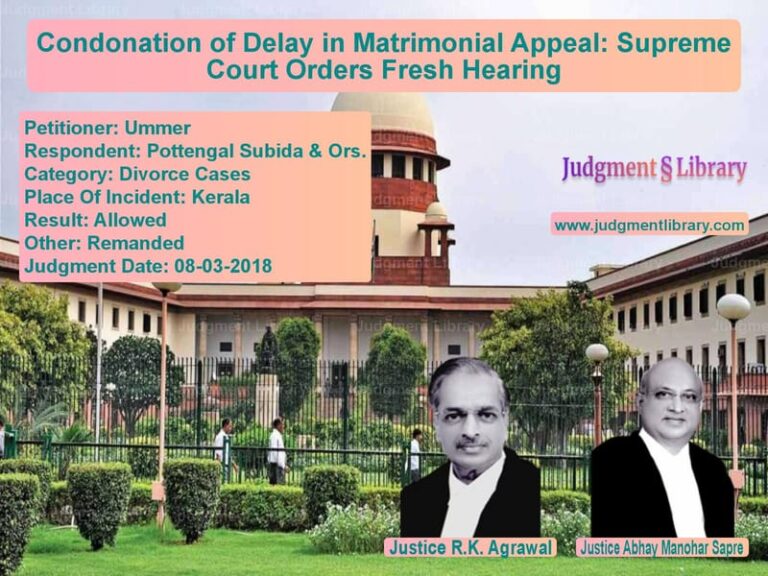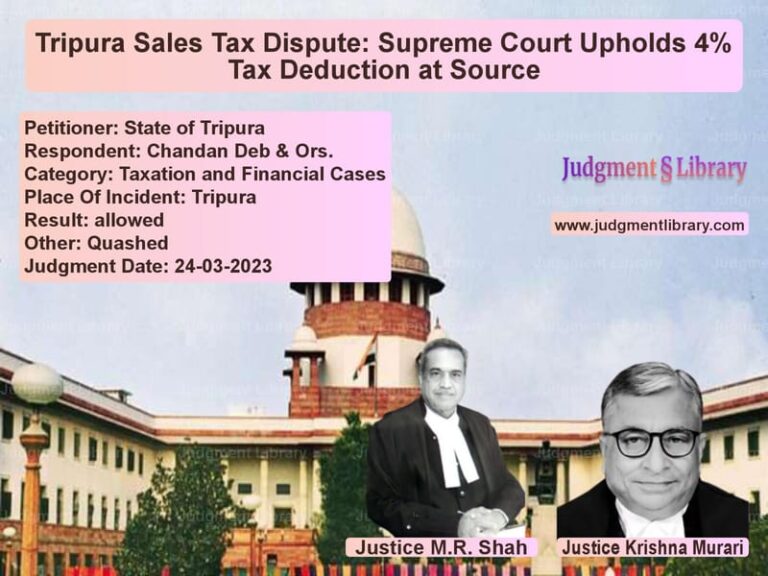NCLT Cannot Revive Time-Barred Debt: Supreme Court Rules on Limitation in Insolvency Cases
The case of Vashdeo R Bhojwani v. Abhyudaya Co-operative Bank Ltd. & Anr. raised a significant question regarding the applicability of limitation laws to insolvency proceedings under the Insolvency and Bankruptcy Code (IBC), 2016. The Supreme Court examined whether a financial creditor could invoke Section 7 of the IBC to recover a debt that was time-barred under the Limitation Act, 1963.
Background of the Case
The case originated when Abhyudaya Co-operative Bank Ltd. initiated insolvency proceedings against Vashdeo R Bhojwani under Section 7 of the IBC, 2016. The bank sought to recover a debt of Rs. 6.7 crore, which had been classified as a Non-Performing Asset (NPA) on December 23, 1999. A Recovery Certificate was issued on December 24, 2001, affirming the bank’s right to recover the outstanding amount. However, the bank only filed its insolvency petition before the National Company Law Tribunal (NCLT) on July 21, 2017, nearly 18 years after the NPA classification.
The NCLT admitted the insolvency petition on March 5, 2018, stating that since the default was continuous, no limitation period applied. The National Company Law Appellate Tribunal (NCLAT) upheld this decision, reasoning that the existence of a Recovery Certificate indicated a continuous cause of action, thereby extending the limitation period.
Petitioner’s (Vashdeo R Bhojwani’s) Arguments
Vashdeo R Bhojwani contended that:
- The bank’s claim was barred by limitation, as more than three years had passed since the issuance of the Recovery Certificate in 2001.
- The Limitation Act, 1963, applied to insolvency proceedings, and the bank could not use IBC to revive a time-barred debt.
- The lower tribunals had erred in considering the default as a continuing wrong, as the liability had crystallized when the Recovery Certificate was issued.
Respondents’ (Abhyudaya Co-operative Bank Ltd.’s) Arguments
The bank argued that:
- The limitation period should be computed from the date of the last acknowledgment of debt, as the Recovery Certificate remained enforceable.
- The existence of the Recovery Certificate confirmed the debt, allowing proceedings under IBC irrespective of limitation.
- Since interest continued to accrue, the liability was ongoing, making it a case of continuous default rather than a one-time default.
Supreme Court’s Observations and Judgment
The Supreme Court analyzed whether the provisions of the Limitation Act applied to proceedings under the IBC. Referring to its earlier ruling in B.K. Educational Services Pvt. Ltd. v. Parag Gupta and Associates, the Court reaffirmed that the Limitation Act applies to all IBC proceedings from the inception of the Code.
The Court held:
“Since the Limitation Act is applicable to applications filed under Sections 7 and 9 of the Code from the inception of the Code, Article 137 of the Limitation Act gets attracted. ‘The right to sue’ therefore accrues when a default occurs. If the default has occurred over three years prior to the date of filing of the application, the application would be barred under Article 137 of the Limitation Act.”
The Court rejected the bank’s reliance on Section 23 of the Limitation Act, which pertains to continuing wrongs. It cited Balkrishna Savalram Pujari v. Shree Dnyaneshwar Maharaj Sansthan, stating:
“It is the very essence of a continuing wrong that it is an act which creates a continuing source of injury. If the wrongful act causes an injury that is complete, there is no continuing wrong, even though the damage resulting from the act may continue.”
Applying this principle, the Court held that the Recovery Certificate issued in 2001 had crystallized the liability, and limitation had begun to run from that date. Since more than three years had elapsed, the bank’s claim was barred by limitation.
The Court concluded:
“When the Recovery Certificate dated 24.12.2001 was issued, this Certificate injured effectively and completely the appellant’s rights as a result of which limitation would have begun ticking. This being the case, and the claim in the present suit being time-barred, there is no debt that is due and payable in law.”
Accordingly, the Supreme Court allowed the appeal, setting aside the orders of the NCLT and NCLAT.
Key Takeaways from the Judgment
- IBC Proceedings Are Subject to Limitation: The Supreme Court clarified that time-barred debts cannot be revived under the IBC.
- Recovery Certificates Do Not Extend Limitation Period: A Recovery Certificate does not constitute a continuing cause of action and cannot be used to circumvent limitation laws.
- Continuing Defaults Do Not Apply to Crystallized Debts: Once a liability is determined and a Recovery Certificate is issued, limitation begins to run from that date.
- Strengthening Borrowers’ Protection: This ruling prevents creditors from misusing the IBC to revive debts that have already become unenforceable under limitation law.
Impact of the Judgment
- Restricts Late-Stage Insolvency Claims: Creditors must act within the limitation period and cannot indefinitely delay enforcement under IBC.
- Ensures Certainty in Financial Transactions: The ruling provides clarity on how limitation laws interact with insolvency proceedings, reducing ambiguity for both borrowers and lenders.
- Guidance for Future IBC Cases: The decision sets a precedent for determining when a debt is considered time-barred under the IBC framework.
Conclusion
The Supreme Court’s ruling in Vashdeo R Bhojwani v. Abhyudaya Co-operative Bank Ltd. reinforces the importance of limitation laws in insolvency proceedings. By preventing the revival of time-barred debts, the judgment upholds the principle that financial creditors must act within prescribed timelines. This decision strengthens the legal framework of the IBC, ensuring that it is not misused to resuscitate stale claims.
Petitioner Name: Vashdeo R Bhojwani.Respondent Name: Abhyudaya Co-operative Bank Ltd. & Another.Judgment By: Justice Rohinton Fali Nariman, Justice Surya Kant.Place Of Incident: India.Judgment Date: 02-09-2019.
Don’t miss out on the full details! Download the complete judgment in PDF format below and gain valuable insights instantly!
Download Judgment: Vashdeo R Bhojwani vs Abhyudaya Co-operati Supreme Court of India Judgment Dated 02-09-2019.pdf
Direct Downlaod Judgment: Direct downlaod this Judgment
See all petitions in Bankruptcy and Insolvency
See all petitions in Corporate Compliance
See all petitions in unfair trade practices
See all petitions in Judgment by Rohinton Fali Nariman
See all petitions in Judgment by Surya Kant
See all petitions in allowed
See all petitions in Quashed
See all petitions in supreme court of India judgments September 2019
See all petitions in 2019 judgments
See all posts in Corporate and Commercial Cases Category
See all allowed petitions in Corporate and Commercial Cases Category
See all Dismissed petitions in Corporate and Commercial Cases Category
See all partially allowed petitions in Corporate and Commercial Cases Category







